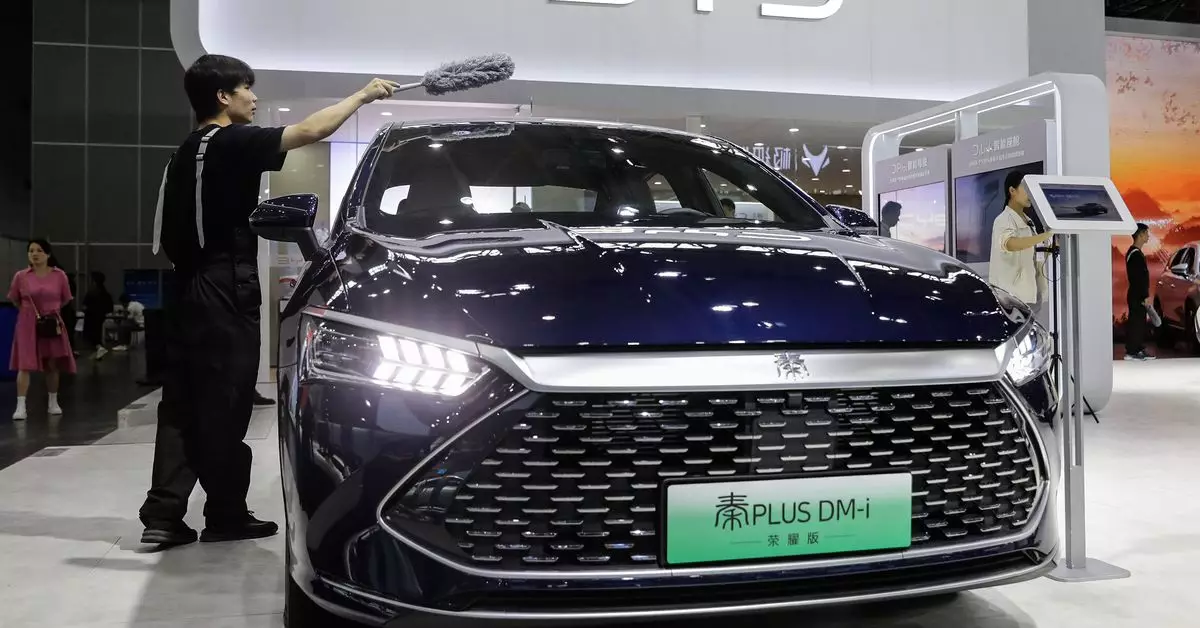As we embark on a new era marked by the proliferation of electric vehicles (EVs), the intersection of technological advancement and national security concerns is becoming increasingly intricate. Recent proposals from the Biden administration signal a significant shift in the automotive regulatory environment, particularly regarding vehicle software and hardware imported from nations deemed “countries of concern.” This stance primarily targets China, which has rapidly ascended to become the world’s leading auto exporter. The implications of these regulations could reshape not only trade policies but also the competitive landscape of the EV market in the United States.
The Biden administration’s proposed regulations aim to block the sale or import of connected vehicle software that originates from nations viewed as antagonistic to U.S. interests, with a sharp focus on China. Officials have raised alarms concerning the vulnerability of vehicles equipped with Chinese technology, suggesting potential threats ranging from data breaches to systemic sabotage. The administration’s concerns include the utilization of technology like Bluetooth, cellular communication, and onboard sensors, which can be exploited to gather sensitive information or disrupt vehicle operations.
This position reflects a broader trend where technological dependencies are scrutinized not just for their economic implications but also for their ability to pose serious risks to national security. Automotive networks that are heavily reliant on foreign technology necessitate a reevaluation of procurement policies, particularly in an era punctuated by geopolitical tension.
Trade Tensions and Economic Implications
The proposed rules emerge simultaneously with sustained trade tensions between the U.S. and China. Notably, the Biden administration has implemented steep tariffs on a range of Chinese imports, including electric vehicles, layout a new 100% duty on EVs along with increased tariffs on critical components like batteries. This multifaceted approach is aimed at cushioning domestic manufacturers from external competition that poses an existential threat.
As the global race for EV supremacy heats up, China’s prowess in producing budget-friendly electric vehicles, such as the BYD Seagull, raises alarms among U.S. manufacturers. With a price point significantly lower than many domestic offerings, the Seagull exemplifies how Chinese carmakers capitalize on efficiency and affordability. U.S. executives—including influential figures like Tesla’s CEO Elon Musk—have acknowledged the dangers of unregulated imports, suggesting that the absence of trade barriers could lead to overwhelming competition that could dismantle domestic auto manufacturing.
Criticism and Counterarguments: A Complex Debate
However, this approach is not without its detractors. Critics highlight that the U.S. government’s stance risks stifling innovation and may inadvertently restrict American consumers’ access to competitive technologies. There are arguments suggesting that portraying trade competition through the lens of national security may limit the economic potential that emerges from collaboration and global trade.
Moreover, critics from China assert that the U.S. has weaponized national security as a means to impede competitive foreign companies under the guise of protecting domestic interests. This assertion adds layers of complexity to an already charged relationship, suggesting that the economic retaliations may escalate further without significant dialogue.
Looking forward, the proposed regulations have far-reaching implications, with software bans slated to take effect for the 2027 model year and hardware prohibitions following suit in 2030. This gradual implementation reflects a strategic approach aimed at preparing the market while emphasizing a shift towards domestic manufacturing and innovation.
For U.S. automakers, the upcoming years represent a pivotal moment to reposition themselves in aligning technology developments with sustainable practices. As they navigate these regulatory waters, a balance must be struck between securing national interests and fostering an innovative automotive environment capable of competing on a global scale.
While national security considerations are undeniably critical, the resulting policies must also accommodate the dynamic nature of the automotive industry. The evolving landscape necessitates a comprehensive approach that encourages innovation while ensuring the integrity and security of connected vehicle systems. With the stakes high and the competition palpable, the U.S. must strategically engage in this globalized market to remain a leader in the next generation of electric vehicles.


Leave a Reply